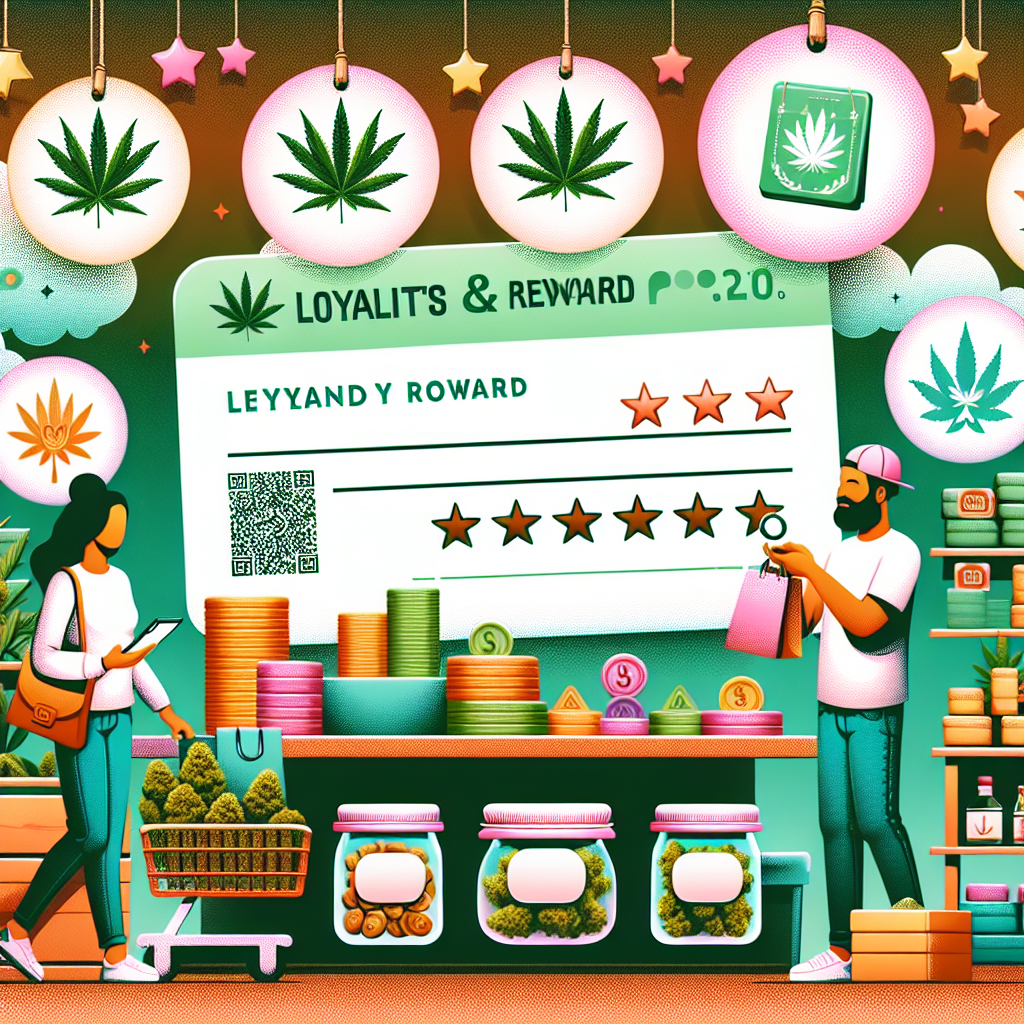
By Karen Henriques April 17, 2024
The Importance of Personalization in Cannabis Loyalty Programs
In the rapidly growing cannabis industry, retailers are constantly looking for ways to stand out and retain their customers. One effective strategy that has been gaining popularity is the implementation of loyalty and reward programs. These programs not only incentivize customers to return to the store, but also provide valuable data for retailers to better understand their customers’ preferences and behaviors. However, in order for these programs to be truly successful, personalization is key.
Personalization in loyalty programs refers to tailoring the rewards and benefits to each individual customer based on their specific needs and preferences. This goes beyond the traditional “one-size-fits-all” approach and instead focuses on creating a unique and personalized experience for each customer. This level of personalization not only increases customer satisfaction, but also builds a stronger sense of loyalty towards the retailer.
One of the main reasons why personalization is crucial in cannabis loyalty programs is because of the diverse customer base in the industry. With the legalization of cannabis in many states, the customer demographic has expanded to include a wide range of ages, backgrounds, and preferences. This means that a one-size-fits-all approach to loyalty programs will not be effective in retaining customers. By personalizing the rewards and benefits, retailers can cater to the specific needs and preferences of each customer, making them feel valued and appreciated.
Moreover, personalization allows retailers to gather valuable data about their customers. By tracking their purchases and preferences, retailers can gain insights into what products are most popular, which customers are most loyal, and what promotions are most effective. This data can then be used to further personalize the loyalty program and tailor it to the needs of the customers. For example, if a customer consistently purchases a certain strain of cannabis, the retailer can offer them a discount on that specific product as a reward for their loyalty. This not only encourages the customer to continue purchasing from the retailer, but also shows that the retailer is paying attention to their preferences.
Another important aspect of personalization in loyalty programs is the use of technology. With the rise of e-commerce and online shopping, customers have come to expect a personalized experience when interacting with retailers. This includes personalized recommendations, targeted promotions, and a seamless shopping experience. By incorporating technology into loyalty programs, retailers can gather even more data about their customers and use it to create a more personalized experience. For example, a retailer can use a customer’s purchase history to recommend new products that they may be interested in, or send personalized promotions based on their preferences.
In addition to personalization, it is also important for retailers to continuously engage with their customers through their loyalty programs. This can be done through various means such as email marketing, social media, and in-store promotions. By keeping customers informed about new rewards and benefits, retailers can maintain their interest and encourage them to continue participating in the loyalty program. This also provides an opportunity for retailers to gather feedback and suggestions from their customers, further enhancing the personalization of the program.
In conclusion, personalization is crucial in cannabis loyalty programs as it not only increases customer satisfaction and loyalty, but also provides valuable data for retailers to improve their offerings. By tailoring rewards and benefits to each individual customer, using technology, and continuously engaging with customers, retailers can create a personalized and effective loyalty program that sets them apart from their competitors. As the cannabis industry continues to grow, personalization will become even more important in retaining customers and building a strong and loyal customer base.
Maximizing Customer Retention through Reward Programs in the Cannabis Industry

In the rapidly growing cannabis industry, customer retention is crucial for the success of any retailer. With more and more states legalizing the use of cannabis, the market is becoming increasingly competitive. This means that retailers need to find ways to stand out and keep their customers coming back. One effective strategy for achieving this is through loyalty and reward programs.
Loyalty and reward programs have been used in various industries for decades, and the cannabis industry is no exception. These programs are designed to incentivize customers to continue shopping at a particular store by offering them rewards for their loyalty. In the cannabis industry, these rewards can range from discounts on products to exclusive access to new strains or products.
One of the main benefits of loyalty and reward programs for cannabis retailers is the ability to maximize customer retention. By offering rewards for their loyalty, retailers can encourage customers to continue shopping at their store instead of trying out competitors. This is especially important in the cannabis industry, where customers may have a wide range of options to choose from.
Moreover, loyalty and reward programs can also help retailers gather valuable data about their customers. By tracking their purchases and preferences, retailers can gain insights into their customers’ buying habits and tailor their offerings accordingly. This data can also be used to create personalized offers and promotions, further increasing customer retention.
Another advantage of loyalty and reward programs is the potential for increased customer spending. When customers know that they will be rewarded for their purchases, they are more likely to spend more money at a particular store. This not only benefits the retailer but also allows customers to get more value for their money.
Furthermore, loyalty and reward programs can also help retailers attract new customers. When existing customers are satisfied with the rewards they receive, they are more likely to recommend the store to their friends and family. This word-of-mouth marketing can be a powerful tool for attracting new customers and increasing sales.
When it comes to implementing loyalty and reward programs, there are various options available for cannabis retailers. Some retailers may choose to offer a points-based system, where customers earn points for every purchase and can redeem them for rewards. Others may opt for a tiered system, where customers can unlock different levels of rewards based on their spending.
Additionally, retailers can also offer exclusive perks and benefits to members of their loyalty program. This can include early access to new products, special discounts, or even invitations to private events. These exclusive rewards can make customers feel valued and appreciated, further increasing their loyalty to the store.
However, it is essential for retailers to carefully consider the costs and benefits of implementing a loyalty and reward program. While these programs can be highly effective in increasing customer retention, they also require resources and investment. Retailers must ensure that the rewards offered are sustainable and align with their business goals.
In conclusion, loyalty and reward programs can be a valuable tool for cannabis retailers looking to maximize customer retention. By offering rewards for their loyalty, retailers can incentivize customers to continue shopping at their store, gather valuable data, and increase customer spending. However, it is crucial for retailers to carefully plan and implement these programs to ensure their effectiveness and sustainability. With the right approach, loyalty and reward programs can be a powerful strategy for success in the competitive cannabis industry.
Innovative Strategies for Building Brand Loyalty in the Competitive Cannabis Market

In the rapidly growing cannabis industry, competition among retailers is fierce. With more and more states legalizing the use of cannabis, the market is becoming saturated with dispensaries and retailers vying for customers. In such a competitive landscape, building brand loyalty is crucial for the success of any cannabis retailer. One effective way to do this is through loyalty and reward programs.
Loyalty and reward programs have been used by businesses in various industries for decades. However, with the unique challenges faced by cannabis retailers, these programs have taken on a new level of importance. Not only do they help to retain customers, but they also serve as a powerful marketing tool to attract new ones.
One of the main benefits of loyalty and reward programs for cannabis retailers is the ability to collect valuable customer data. By offering rewards and incentives, retailers can encourage customers to sign up for their loyalty program, providing them with important information such as purchase history, preferences, and contact details. This data can then be used to tailor marketing strategies and promotions, making them more effective and targeted.
Moreover, loyalty and reward programs can help to create a sense of community among customers. In the cannabis industry, where there is still a stigma attached to the use of cannabis, building a community of loyal customers can be a powerful way to break down barriers and create a positive image for the retailer. By offering exclusive rewards and benefits to members of the loyalty program, retailers can foster a sense of belonging and make customers feel like they are part of something special.
Another innovative strategy for building brand loyalty in the competitive cannabis market is through gamification. This involves incorporating elements of gaming into the loyalty program, making it more engaging and fun for customers. For example, retailers can offer points or rewards for completing certain tasks or challenges, such as trying new products or referring friends. This not only encourages customers to interact more with the brand but also creates a sense of excitement and competition among members of the loyalty program.
In addition to traditional loyalty and reward programs, some cannabis retailers are taking a more creative approach to building brand loyalty. For instance, some retailers have started offering “cannabis subscriptions” where customers can sign up to receive a curated selection of products on a regular basis. This not only provides customers with a convenient way to purchase their favorite products but also creates a sense of anticipation and exclusivity, as the products are only available to subscribers.
Furthermore, retailers can also use loyalty and reward programs to promote responsible and safe cannabis consumption. By offering rewards for returning used packaging or participating in educational events, retailers can show their commitment to promoting responsible use and building a positive image for the industry.
It is worth noting that loyalty and reward programs are not a one-size-fits-all solution for cannabis retailers. Each retailer must carefully consider their target audience and tailor their program to meet their specific needs and preferences. For example, a loyalty program that offers discounts and rewards may be more appealing to budget-conscious customers, while a program that focuses on exclusive experiences and events may attract a more affluent clientele.
In conclusion, loyalty and reward programs are an innovative and effective strategy for building brand loyalty in the competitive cannabis market. By collecting valuable customer data, creating a sense of community, incorporating gamification, and promoting responsible consumption, retailers can not only retain customers but also attract new ones and create a positive image for the industry. As the cannabis market continues to grow, loyalty and reward programs will become an essential tool for retailers looking to stand out in a crowded market and build a loyal customer base.